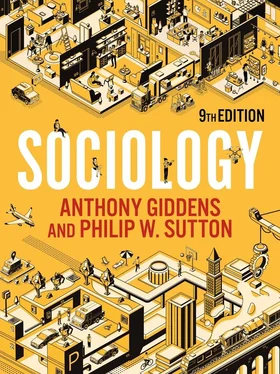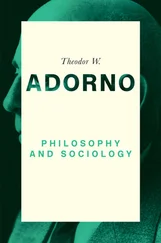4 Chapter 6 Table 6.1Cross-country, within-country and global inequalities
5 Chapter 8 Table 8.2Positive responses (callback) by minority status of the applicant
6 Chapter 9 Table 9.1Goldthorpe/CASMIN and UK ONS-SEC social class schemes alongside more commonly us…
7 Chapter 22 Table 22.1Adaptive responses to social strain Table 22.2Reasons for not reporting crime, year ending March 2017 Table 22.3Strengths and limitations of the CSEW and police-recorded crime figures
1 Chapter 1 Classic studies 1.1Emile Durkheim’s study of suicide
2 Chapter 2 Classic studies 2.1The social psychology of prison life Classic studies 2.2Theda Skocpol’s comparison of social revolutions
3 Chapter 3 Classic studies 3.1Neo-Marxism: the Frankfurt School of critical theory
4 Chapter 4 Classic studies 4.1Immanuel Wallerstein on the modern world-system Classic studies 4.2Anthony Giddens: riding the juggernaut of modernity
5 Chapter 5 Classic studies 5.1Ulrich Beck and the global risk society Classic studies 5.2Modelling the limits to economic growth
6 Chapter 6 Classic studies 6.1Demographic transition theory Classic studies 6.2Walt Rostow and the stages of economic growth
7 Chapter 7 Classic studies 7.1Uncovering sexual diversity in the USA Classic studies 7.2Connell on the dynamics of the gender order
8 Chapter 8 Classic studies 8.1Institutional racism – the Stephen Lawrence Inquiry Classic studies 8.2Patterns of mobility in the new age of migration
9 Chapter 9 Classic studies 9.1Marx on class and revolution Classic studies 9.2John Goldthorpe and the EGP class schema
10 Chapter 10 Classic studies 10.1Talcott Parsons on society’s ‘sick role’
11 Chapter 11 Classic studies 11.1Peter Townsend on poverty and deprivation Classic studies 11.2T. H. Marshall and the evolution of citizenship in Britain
12 Chapter 12 Classic studies 12.1Erving Goffman – ‘all the world’s (a bit like) a stage’ Classic studies 12.2Harold Garfinkel’s experiments in ethnomethodology
13 Chapter 13 Classic studies 13.1The metropolis and mental life Classic studies 13.2Urbanism as a way of life
14 Chapter 14 Classic studies 14.1George Herbert Mead – Mind, Self and Society Classic studies 14.2Nancy Chodorow: attachment, separation and gender identities
15 Chapter 15 Classic studies 15.1Talcott Parsons on the functions of the family Classic studies 15.2From social institution to family practices
16 Chapter 16 Classic studies 16.1Basil Bernstein on language and social class
17 Chapter 17 Classic studies 17.1Ann Oakley on housework and the housewife role Classic studies 17.2Harry Braverman on the degradation of work in capitalist economies
18 Chapter 18 Classic studies 18.1The elementary forms of the religious life
19 Chapter 19 Classic studies 19.1‘Bad News’ from the Glasgow University Media Group Classic studies 19.2Jürgen Habermas – the rise and fall of the public sphere
20 Chapter 20 Classic studies 20.1Stephen Lukes – a ‘radical view’ of power Classic studies 20.2Neil Smelser on understanding social movements Classic studies 22.2Stan Cohen’s folk devils and moral panics
21 Chapter 21 Classic studies 21.1Norbert Elias – on the process of civilization Classic studies 21.2Carl von Clausewitz, On War (1832)
22 Chapter 22 Classic studies 22.1Robert Merton and the failing American dream Classic studies 22.2Stan Cohen’s folk devils and moral panics
List of Using Your Sociological Imagination
1 Chapter 1 Using Your Sociological Imagination 1.1Neglected founders of sociology?
2 Chapter 3 Using Your Sociological Imagination 3.1Marx and Weber – the shaping of the modern world
3 Chapter 4 Using Your Sociological Imagination 4.1Newly industrializing countries Using Your Sociological Imagination 4.2‘Barbie’ and the development of global commodity chains
4 Chapter 5 Using Your Sociological Imagination 5.1Crossing the species barrier: the UK BSE crisis Using Your Sociological Imagination 5.2ClimateGate: a cautionary tale Using Your Sociological Imagination 5.3The car is dead – long live the car?
5 Chapter 6 Using Your Sociological Imagination 6.1Demography – the key concepts Using Your Sociological Imagination 6.2Raising the ‘bottom billion’ out of poverty
6 Chapter 7 Using Your Sociological Imagination 7.1Theorizing patriarchy Using Your Sociological Imagination 7.2Masculinity and sexuality in schools
7 Chapter 8 Using Your Sociological Imagination 8.1Black identity and the ‘new ethnicities’ Using Your Sociological Imagination 8.2The Windrush scandal
8 Chapter 9 Using Your Sociological Imagination 9.1The death of class? Using Your Sociological Imagination 9.2‘Disidentifying’ with the working class?
9 Chapter 10 Using Your Sociological Imagination 10.1Complementary or Alternative Medicine? Using Your Sociological Imagination 10.2Psychopharmaceuticals: from treatment to enhancement? Using Your Sociological Imagination 10.3Applying the social model to assumptions in the OPCS questions Using Your Sociological Imagination 10.4‘Cripping’ theory and politics
10 Chapter 11 Using Your Sociological Imagination 11.1Social exclusion at the top? Using Your Sociological Imagination 11.2Welfare-to-work in the USA
11 Chapter 12 Using Your Sociological Imagination 12.1Everyday sexism in public places Using Your Sociological Imagination 12.2Encountering ‘dangerous persons’ Using Your Sociological Imagination 12.3Why are other people so rude?
12 Chapter 13 Using Your Sociological Imagination 13.1Social inequalities in ‘cities of quartz’
13 Chapter 14 Using Your Sociological Imagination 14.1Playing with gender Using Your Sociological Imagination 14.2An ageless future?
14 Chapter 15 Using Your Sociological Imagination 15.1Diane Vaughan on ‘uncoupling’: the experience of breaking up Using Your Sociological Imagination 15.2Carol Smart and Bren Neale’s Family Fragments ? Using Your Sociological Imagination 15.3Bean-pole families
15 Chapter 16 Using Your Sociological Imagination 16.1Learning not to labour Using Your Sociological Imagination 16.2The British public schools
16 Chapter 17 Using Your Sociological Imagination 17.1Industrial conflict and strikes Using Your Sociological Imagination 17.2The five Cs of women’s work Using Your Sociological Imagination 17.3The end of (human) work? Using Your Sociological Imagination 17.4Less work = a better life?
Читать дальше












